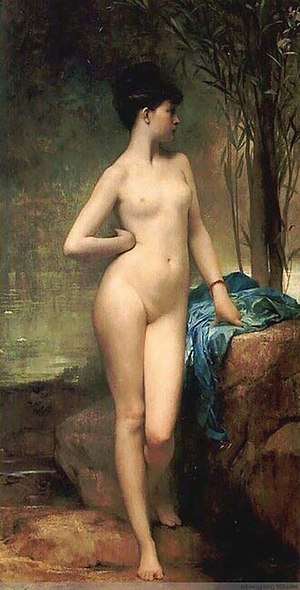Chloé (artwork)
Chloé is a 260 by 139 cm oil canvas painting of a young Parisian girl by French figure painter Jules Joseph Lefebvre, made in 1875. The painting is located in the upstairs bar of the Young and Jackson Hotel in Melbourne, Australia, where it has been since 1909.[1] She is known as the "Melbourne Icon" and was the mascot of HMAS Melbourne.[2]
| Chloé | |
|---|---|
 | |
| Artist | Jules Joseph Lefebvre |
| Year | 1875 |
| Medium | Oil on canvas |
| Dimensions | 260 cm × 139 cm (100 in × 55 in) |
| Location | Young and Jackson Hotel, Melbourne |
History
Chloé made its first debut in the Paris Salon in 1875 with great success. With that success, it and Lefebvre won the Gold Medal of Honour in 1875. It was subsequently displayed in art exhibitions such as the French Gallery at the Sydney International Exhibition in 1879 and the Melbourne International Exhibition in 1880.
Chloé was then purchased by Dr. Thomas Fitzgerald of Lonsdale Street, Melbourne, for 850 guineas.[2] Controversy arose when the painting was to be exhibited on Sundays. The Presbyterian Assembly found the painting to be too scandalous to show on Sundays, so it had to eventually be taken down from galleries.[3] Upon Fitzgerald's death in 1908, the painting was auctioned off to Norman Figsby Young.[2] Henry Young and Thomas Jackson bought Chloé in 1908 from Norman Figsby Young and placed the painting in the bar of their hotel.[2]
Influence on soldiers
Chloé captivated many soldiers who frequented the bar of Young and Jackson's Hotel during World War I, World War II, the Korean War and the Vietnam War. Letters were addressed to her from the trenches in Turkey, France, and Papua New Guinea, promising to return to her. American soldiers even went as far as coming up with a plan to abduct her.[2]
Exhibitions
- Paris Salon Exhibition, 1875
- Sydney International Exhibition, 1879
- Melbourne International Exhibition (1880)
- Adelaide Gallery Exhibition, 1883
- Blamey House Women's Auxiliary
- Fundraiser, 1940
- National Gallery of Victoria 1883, 1995, 2000
Awards
- 1875 – won gold medal of Honour
- 1879 – Won highest award at the Sydney International Exhibition
- 1880 – Won highest award at the Melbourne International Exhibition
Damage and restoration
On Friday, 24 September 2004, at 8:30 pm, a hotel patron fell against the painting and caused long vertical cracks in its 5-millimetre (0.2 in)-thick protective glass.[4] Art experts said the damage was minor and would not affect the overall value of the painting.[4] It was repaired at the Ian Potter Conservation Centre in the Ian Potter Museum of Art in Melbourne, where it waited for protective German glass to be imported, and was restored to the hotel bar on 13 October 2004.[5]
The model
The model for the painting was named Marie, not Chloé. Of Persian descent, she was born to a poor family in 1856. She left home at a young age and started posing for artists to gain some income for herself and her sister. She was 19 when she modelled for Chloé. There is controversy about the nature of her relationship with Lefebvre. Some have claimed that she had a sexual relationship with him, while others have said that he rejected her.[6] Another account says that he seduced both Marie and her sister. Whatever the truth, a year after Lefebvre completed the Chloé painting, he married her sister. A year after that, Marie hosted a party with close friends, during which she slipped away into the kitchen and made and drank a poisonous substance. The exact reason for her suicide remains unknown but some have speculated that she did it because of her unrequited love for Lefebvre.[3]
Young and Jackson Hotel
Chloé is to remain part of the hotel forever, as decided by the National Trust and Heritage of Victoria in 1988. The hotel holds free information tours and sessions to teach people the history, origins, and the prominence of the painting.
References
- "Chloe at the Young & Jackson Hotel", Melbourne Online
- "Chloe – Jules-Joseph Lefebvre", details, OnlyMelbourne.com.au. Retrieved 18 March 2014
- "Chloe", Young and Jackson. 18 March 2014 Archived 26 January 2014 at the Wayback Machine
- Milanovic, Selma (28 September 2004). "Chloe's encounter scratches surface". The Age. Retrieved 31 July 2020.
- Villarreal, Ignacio, ed. "Melbourne's Famous Chloe Painting Restored", Art Daily. Retrieved 18 March 2014.
- "Chloe – Queen of the Bar Room Wall". h2g2. 21 February 2003. Retrieved 14 June 2020.